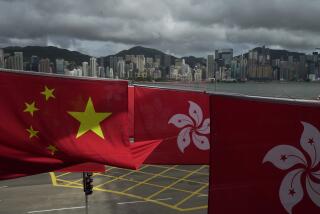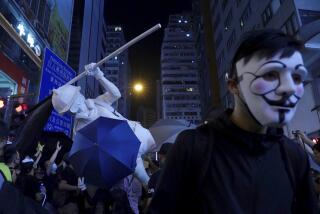There’s Risk in Crying Wolf on Hong Kong
- Share via
At her confirmation hearing and in her first press conference, Secretary of State Madeleine Albright used the same striking phrase to describe her proposed approach to controversial issues like China. She would “tell it like it is,” she said. Albright’s use of this homely yet immediately appealing expression provides further evidence that she will be a formidable exponent of American foreign policy.
The main reason for the phrase’s appeal is that it creates an expectation of refreshing clarity. Unfortunately, this beguiling prospect may turn out to be another grand illusion. In the ambiguous world of international politics, clear-cut choices between competing interests and values are rare. One person’s certitude is another’s smoke and mirrors.
Take Algeria, for example, where in the just-concluded month of Ramadan, more than 200 people have died in violence instigated by the Islamist opposition. At first sight, fundamentalist terrorists supported by the likes of Iran are the obvious guilty party. But wait. .J.J. The present government came to power by canceling the 1992 election to prevent a probable opposition victory. Isn’t this just the sort of democracy-trampling behavior for which Serbian President Slobodan Milosevic has earned such massive U.S. condemnation?
No one will care if the administration cuts logical corners over so-called rogue states or fading dictators. But with regard to Albright’s chosen example of China and Hong Kong, her brisk no-nonsense approach risks backfiring. If tough rhetoric takes precedence over clear thinking, it could inflict real damage on some extremely vulnerable people, namely those who continue to live in Hong Kong after the territory reverts to China in July.
The superficial facts appear straightforward. Last week’s announcement that China proposes to limit certain aspects of Hong Kong’s Bill of Rights Ordinance, such as the right to public assembly, intensified doubts about China’s commitment to preserving Hong Kong’s democratic and capitalist way of life. That Tung Chee-hwa, Hong Kong’s chief executive-designate, accepted the curbs without protest confirmed the gloomy assessment that Hong Kong’s future administration will slavishly follow Beijing’s bidding.
The romantic picture of the plucky David girding himself against the brutish Goliath is dangerously misleading. In fact, serious lovers of freedom (among them Margaret Thatcher and Ronald Reagan) have labored zealously to protect Hong Kong’s interests. Some 20 years of hard negotiating obtained a series of highly specific agreements committing China to safeguard Hong Kong’s unique way of life. China can be an awkward actor on the international stage but, in relation to Hong Kong, it has kept its word.
The most important of China’s commitments is the 1984 joint declaration with the British government. This document (and its three annexes and notes) sets out the transition process in great detail, including the appointment procedures for the chief executive and first legislature.
The joint declaration was amplified in 1990 by China’s promulgation of the Basic Law guaranteeing Hong Kong’s special status as a special administrative region of China. Even in the more skeptical post-Tiananmen circumstances, the U.S. government raised no objections.
Since 1984, a Chinese-British joint liaison group has met regularly, discreetly fleshing out additional guarantees for children’s, women’s and workers’ rights, establishing investment and intellectual property guarantees, and securing Hong Kong membership in international economic bodies such as the World Trade Organization. The group has also produced major infrastructure agreements with China, for example over the financing of Hong Kong’s new international airport and the expansion of its container port.
In the recent stampede to condemn Chinese actions, this positive background has been overlooked. Instead, critics have concentrated narrowly on China’s rejection of certain unilateral British initiatives, such as the 1995 expansion of the electoral franchise, to which China was never a contractual party.
This highly complex web of claims and counterclaims illustrates the pitfalls of the “tell it like it is” approach. The “it” is very elusive. Whether the Chinese have abided by their commitments to Hong Kong or are preparing to violate them depends crucially on the observer’s viewpoint. It is possible to make the argument either way.
In the U.S., China policy is regularly presented as a mutually exclusive choice between pure democracy and filthy lucre. This is a false dichotomy. With sensible management, both can be advanced. Pugnacious, oversimplified rhetoric is the opposite of what Hong Kong needs.
More to Read
Sign up for Essential California
The most important California stories and recommendations in your inbox every morning.
You may occasionally receive promotional content from the Los Angeles Times.













